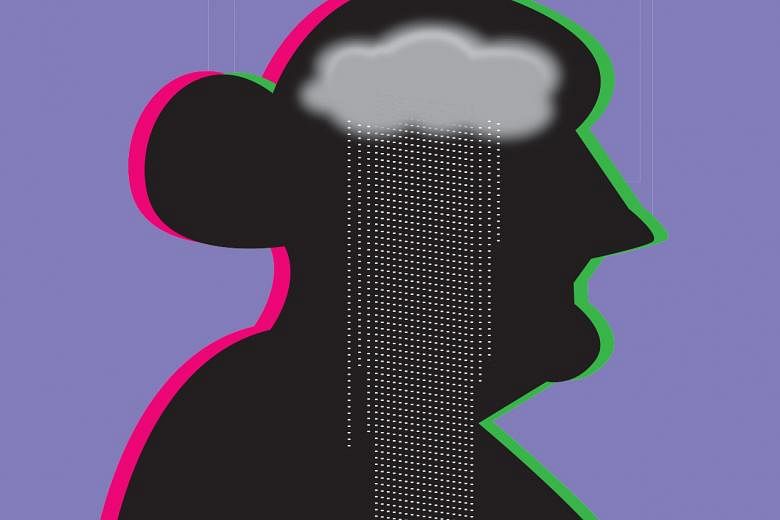"What do you want us to do?" asked the person who had answered my desperate phone call to the family service centre. My first, shameful thought while glancing at the woman crying in the seat next to me was: I want you to make this go away.
What would you do if an elderly stranger, lost and afraid, came to you for help? Compassion wars with a secondary impulse to avoid responsibility, as well as embarrassment when others turn to look at your predicament.
She was in her 60s, walked with a limp and held bags of medicine from the nearby hospital's pharmacy. She walked into the street-level cafe where I was interviewing a newsmaker and said, in a child's voice: "I need to go to church, but I don't know how to go. I've lost my money. Can you help?"
She burst into tears, the unself-conscious bawling of a lost child, not the guarded tears an adult sheds to avoid drawing attention. There are scams and then, there are the unmistakeable signs that a person has suddenly, frighteningly, lost touch with present reality. The facial muscles are no longer under the brain's control. The hands tremble while reaching out to the first non-threatening stranger. Memories of the past are incandescent, but knowledge of this place and time is terrifyingly absent.
While other patrons of the cafe gawked, the newsmaker I was interviewing made the crying woman sit down, bought her coffee and water. She refused food.

I patted her arm and asked questions. Did she have family? She made a confused speech about her schooldays.
Children, a husband? Was there anyone we could call to help her?
The priest at Our Lady of Lourdes, she said, naming a church at the other end of the island. She was convinced that once she got there she would know what to do.
"Is there some medication you should take?" I asked.
"Oh," she said, seeing the pharmacy bags as if for the first time. "Yes, maybe I should take it now."
She remembered a family service centre which later turned out to be near her flat. I called the centre and got her case worker on the line. He spoke to her for 20 minutes, calming her down and reminding her how she could get home. She had not "lost her money". She had forgotten using it to make payments at the hospital.
I took my phone back. "Are you all right?" the case worker asked.
I nearly started crying myself. Of all forms of mental ill-health, dementia is the one I fear the most.
I saw my mental giants of grandmothers lose their memory, vocabulary and understanding to age and disease. One recovered these before her death, the other didn't. We loved that person too, but I would prefer to die before losing my self the same way.
I have worked hard to become a writer. I rejoice in the clear articulation of facts, in phrases strung together to create meaning, order and sometimes beauty. The thought that my neurons might misfire to deprive me of this skill is terrifying.
The thought that this fate is inevitable, haunts me.
I watch myself and my parents constantly, unconsciously, for signs of forgetfulness or disordered thoughts. Any behaviour outside the normal triggers an instinctive repulsion. I look away from the woman shouting nonsense in the bus and turn up the volume of my music playlist. I avoid the old man falling repeatedly on all fours and laughing. I fear to acknowledge them or see them because I am terrified I might see my future self.
So many are like me, afraid to talk about mental malfunction even though a 2011 study named Singapore the top city in the world for reported cases of obsessive compulsive disorder (OCD). There is depression, paranoia, schizophrenia or the crumbling decay of thought wrought by Alzheimer's Disease.
If I share how thyroxine medication liberated me from near-crippling fatigue, colleagues, friends and newsmakers share their own or their loved ones' battles with demons. Teenagers with so much social anxiety or OCD that they are unable to befriend classmates . Twenty- and 30-somethings so overwhelmed by the simplest demands of life that some become shut in, afraid to leave the home. Others are lucky enough to reclaim their stability through pills.
It took over an hour for the crying woman to return to herself. Then she got up, hugged me and the newsmaker, and left. The case worker had told us that she would be fine now and we should let her make her way independently. It was a relief to hear that. I was happy to have helped, but happier to see her walk away.
Then, the newsmaker spoke of a mother who had Alzheimer's, a brother who had schizophrenia. "You always hope that if it were your family, someone would be there to care for them."
Ashamed, I looked again at the woman walking slowly away from us towards the MRT station. In her insistence that she could make her own way, I saw a bit of myself.
This time I did not look away.


